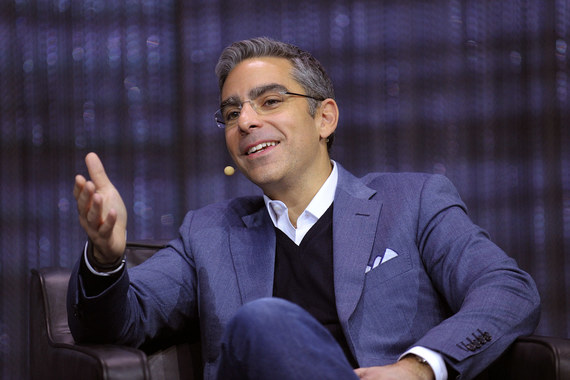Vice President of Communication Products Facebook - on monetization of the messenger and virtual assistant M
 At the dawn of an entrepreneurial career, David Marcus worked in an area completely unrelated to artificial intelligence. He left Geneva University to create the first tech company GTN Telecom . There he came up with a kind of know-how - to offer clients a premium service for sms voting on television shows, including Nouvelle Star in France and Pop Idol in the UK. He worked as the CEO of GTN Telecom for four years and sold the business to World Access.
At the dawn of an entrepreneurial career, David Marcus worked in an area completely unrelated to artificial intelligence. He left Geneva University to create the first tech company GTN Telecom . There he came up with a kind of know-how - to offer clients a premium service for sms voting on television shows, including Nouvelle Star in France and Pop Idol in the UK. He worked as the CEO of GTN Telecom for four years and sold the business to World Access.Source: ERIC PIERMONT / AFP
He moved to Silicon Valley in 2008. There, he created the company Zong - provider for making payments via mobile phone. He also sold this company in 2011 and earned $ 240 million. The buyer was eBay , which at that time owned PayPal . Marcus himself received an offer to become vice president of PayPal, and later became president of the company.
')
When Facebook CEO Mark Zuckerberg last year invited PayPal president David Marcus to dinner, he thought it would be a business partnership between the two companies.
But Zuckerberg offered Marcus to change the team of 15,000 people to PayPal, to 200 people to Facebook, and to be vice president of communications products.
The chance that once in a lifetime is for one person and once in a lifetime on a generation scale - that was the main argument to say Zuckerberg “yes,” says Marcus. Chance - to turn Facebook messenger into a new platform that is used by billions of people.
Markus has been involved in the implementation of these ambitious plans for a year and a half. During this time, Facebook messenger has become an independent product, the number of active users has grown from 300 million to 700 million people per month.
Facebook later its competitors joined the struggle of virtual personal assistants. Service M must compete with personal assistants like Apple's Siri and Microsoft's Microsoft-equipped voice interface and speech recognition.
Here, I spend 90% of my time on making the most advanced product that will give people new opportunities, not on coming up with goals and then deciding how to implement them.
“If the messenger system is not sure whether it will be able to complete the task on its own, it will redirect the request to the employee,” he explains. The virtual assistant M has a good potential, Markus is sure. It is being tested by several hundred Bay Area residents in San Francisco.
Unlike competitors Siri and Cortana , M uses both resources for processing requests — an algorithm and a team of people; therefore, in addition to simply searching for information, the service is able to perform actions: reserve a table in a restaurant, for example.
Marcus himself likes to use service M to send gifts, in particular flowers. At the same time, he categorically rejects the assumption that soon artificial intelligence can become smarter than man:
I think people will take part in this process for a long time - very, very long.
Facebook Messenger will provide a new revenue stream when it introduces a paid service. Most likely, paid services will be offered to retailers, who can use them for direct communication with customers, promotion of goods and holding various promotions.
The entire business model of other similar Facebook services depends on the results of the monetization of the messenger. In the summer, Facebook announced the release of a messenger version for business, which will allow trading companies to interact with customers and provide a tool for sending money, Vedomosti reports, citing the Financial Times.
Market participants are closely watching the fate of the virtual assistant M: turning it into a source of income would not only support Facebook’s overall business, but also become a model for the team that commercializes the WhatsApp messenger bought last year for $ 22 billion. WhatsApp is now operating independently of its founders, Jan Kuma and Brian Acton, who work close to Marcus.
“We often meet,” notes Marcus. If Marcus manages to monetize the functions of the messenger, he will be able to extend his leverage to another 1 billion WhatsApp users. “I hope we find something that works and becomes a business model for both services,” he says. “But for now this is not working.”
Facebook is among the favorites on Wall Street: shares rose more than 150% from the start of listing in 2012, and revenues by 38% to $ 17.2 billion this year.
Estimates of the prospects of certain companies are not really so obvious, and the companies themselves are not so transparent, warns Marcus:
I think that the public market is a healthier means of financing than private investment. Evaluation of some projects of private companies in some respects is quite problematic.
Source: https://habr.com/ru/post/296422/
All Articles